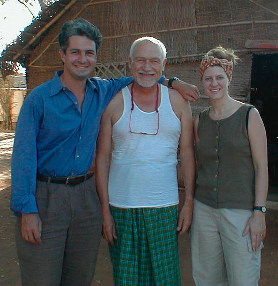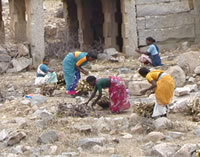|
|
  iMahal Interview Series:
iMahal Interview Series:
David Gimbel
July 22, 2001
iMahal:
Now that Archaeos is up and running, you must manage the projects. How do you get and manage an archeology project like Vijayanagara? How do you get permission to take stuff? Do you use local labor, or bring it in?
 Gimbel:
We never take anything out of anywhere, for two reasons. First of all, most of these countries have much stronger patrimony acts. It's peculiar that in the United States we regard ourselves as such an advanced civilization and we have so little interest in our own native cultures. My understanding, and I may be wrong about this, is that if you have an archeological site on your land in the United States, it belongs to you. It's your property. You can dig it up, you can dynamite it, you can sell it, you can mine it, you can do whatever you want with it. And that's unusual. I don't know of any other country in the world that would permit that.
Gimbel:
We never take anything out of anywhere, for two reasons. First of all, most of these countries have much stronger patrimony acts. It's peculiar that in the United States we regard ourselves as such an advanced civilization and we have so little interest in our own native cultures. My understanding, and I may be wrong about this, is that if you have an archeological site on your land in the United States, it belongs to you. It's your property. You can dig it up, you can dynamite it, you can sell it, you can mine it, you can do whatever you want with it. And that's unusual. I don't know of any other country in the world that would permit that.
Second, our charter actually prohibits us from taking anything out of any country. That's an agreement we came to with the IRS when we were incorporated. But it was an agreement of our own choice. We put that in the charter. We said, "look, we're not interested in taking anything out of anywhere." So that's clearly defined.

|
|
David Gimbel, John Fritz, Jessica Glass
|
For Vijayanagara, agreements were made with the Indian government by John Fritz, the project's co-director. My understanding is that the American Institute of Indian Studies passed our proposal on to the Indian government, which in turn granted us the research visa. India, as is true of many countries, has a dichotomy between central government and state government. So, on the one hand we needed permission from the central government, on the other hand we had to have a relationship with the government or the department of antiquities in that particular state, namely Karnataka. We were very fortunate. In India, John already had these relationships. He had been working at Vijayanagara for 20 years. He and George Michell, who continue to direct the Vijayanagara Research Project, are probably among the foremost experts on Vijayanagaran culture. The camp that we stayed in belongs to the Department of Antiquities and Museums of the State of Karnataka. So we are actually living with them. It's a kind of split compound. They're in a bunch of brick buildings, and we're in a bunch of grass huts. But they are entirely aware of what we are doing, because we're living with them. They are very friendly people and I enjoy living and working with them.

|
|
Women Clearing Brush
|
We did need local labor. Because we were doing surface archeology, we had to clear a tremendous amount of brush. I think we hired about 40 local workers. And the Department of Antiquities for Karnataka was kind enough to allow us to use about 5 of their supervisors to direct the workers. That's a good relationship to have. I would always prefer to have as deep an involvement as possible with the local government for several reasons. First of all, an ideological one: I'm a westerner, going in there, what do I know about this culture? Do I even have right to interpret it? It's not my land, it's not my culture, it doesn't belong to me. So I want their involvement. And I want their feedback. If I had the choice, I would rather train the Indians to do this. I would be much happier if every person I was working with was Indian because, as I said before, part of the mission of Archaeos is to enable people to do this type of work. Ideally I'd like to empower people who don't have the same cultural baggage that I do, to do that work in their own country. I do hope that in the future we will have an opportunity to help train Indian scholars to do the surveying and to do the modeling on the computers. Once the project is up and running, I would probably be happy to turn it over to them.
One of the things that has been different for me about working in India than working in Syria is the fact that you're dealing with a living culture. In Syria, the areas of the site that we were working at were approximately 4600 years old and it's not part of a living culture. The people who are living there, Kurds, are a different ethnic and cultural group. In India, when you work at a place like Vijayanagara, a lot of these temples are still being used in worship as part of the active culture there.
|
..These people are active participants in their history..
|
These people are active participants in their history. You're just viewing a little slice of what is a very long historical continuum. I think that you have to respect that relationship. I think that many archeologists go to a foreign country and start working there, and then see things that they may not like. They may feel that archaeological sites are not being properly protected, preserved, or excavated. It's very important, however, to respect the fact that you're dealing with a living culture. And it's not yours. All you can do is go in there and try to enable people to do better work by supplying them with technical and methodological knowledge that they might not otherwise have access to.
This is a simple reflection of economic divisions in the modern world. As westerners, we tend to have the financial means to access new technologies before other cultures do. My own hope is that one day our cultural roles will be reversed, and that through growing technological and methodological empowerment, other cultures will eventually be teaching us to conduct our own research in entirely new ways.
|
..I want to be educated and informed by their world view..
|
I think my feelings on this go back to the issues that I discussed when I was talking about my childhood. You have to be very careful about your cultural role when you deal with different societies. I don't want to go in there and impose my world view on anybody. In fact, what I want is the opposite. I want to be educated and informed by their world view. As I said before, I don't pretend to be an expert on India; it is unlikely that I will ever have a great deal of expertise about Indian culture. What I have expertise in is archeology, and that's where I can make a contribution. In the vaster realm of knowledge, I'm a recipient of that knowledge, I'm not the giver.

All photographs copyright and courtesy of David Gimbel or Archaeos

|
 |





